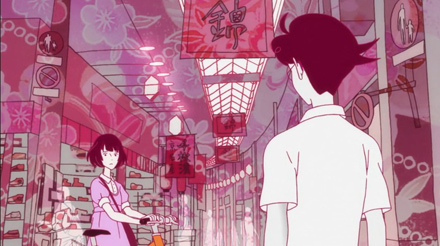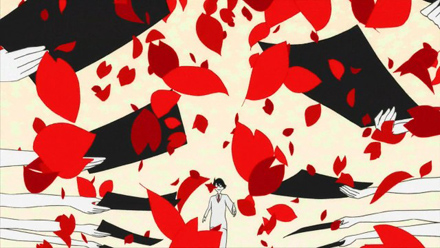Note: This piece is a Japanator Feature.
Is there any one of us who looks back at life and wished we could have done something different?
Most of us realize this is a futile way of thinking and move on. But if we had incredible angst and the ability to time travel, our lives might look a bit like The Tatami Galaxy, noitaminA’s Spring 2010 anime series.
The story stars a college student who is never named, (perhaps so the viewer can more easily relate to him,) who is constantly searching for the ideal college experience, as he puts it: “that rose colored campus life.” However, each path he takes and each club he joins leads to an ultimately negative experience. However, the one bit of luck that our protagonist has come across is the ability to press CTRL+Z on the entire experience and begin again from his first day of college. He does this no less than nine times in an effort to find happiness at college.
But even by attempt number two, our protagonist is falling into the same patterns. He’s always encountering the same people, facing the same problems, and living in the same 5-tatami-mat room.
As I watched the protagonist hopelessly alter time without changing himself, I began to realize that he was having a quarter-life crisis.
Before the recession, identity crises were for the middle-aged and called “Mid-Life Crises.” But in an economic environment which is forcing graduates like myself to dwell in a sort of limbo as we hunt for jobs, these struggles are occurring far earlier. Between school and a career, the present fades away as we contemplate the past and idealize the future. What could I have done better so that I would have a job right now? Where will I be in five years? What paths should I be walking right now to succeed, and how many?
This phenomenon has popularized psychologist Jeffrey Arnett’s idea of Emerging Adulthood, a proposed new life stage that takes place in the twenties:
“Having left the dependency of childhood and adolescence, and having not yet entered the enduring responsibilities that are normative in adulthood, emerging adults often explore a variety of possible life directions in love, work, and worldviews.”
Sounds a lot like a quarter-life crisis — and the plot of Tatami Galaxy — to me. The protagonist might be a bit younger, but his story consists entirely of exploring different paths to achieve the life he wants. However, even with the ability to travel through time and try again, he’s not able to succeed until he realizes, as Arnett believes, that emerging adulthood is an internal struggle:
Just as adolescence has its particular psychological profile, Arnett says, so does emerging adulthood: identity exploration, instability, self-focus, feeling in-between and a rather poetic characteristic he calls “a sense of possibilities.” A few of these, especially identity exploration, are part of adolescence too, but they take on new depth and urgency in the 20s. (via The NYTimes.)
Parallel to Arnett’s beliefs, the protagonist comes to realize that it’s not our surroundings that decide our fates — this comes from within ourselves. We will be stuck repeating the same patterns over and over in our exterior lives until we find it within ourselves to change our behaviors and beliefs.
The Tatami Galaxy is a lesson about being present. By rewinding time, the protagonist is essentially dwelling on past events and hypothetical desires. When he realizes that “now” is the only time that exists, he’s able to move on. The story can only conclude when the protagonist realizes that he is the cause and sum of all his experiences — and accepts it.


